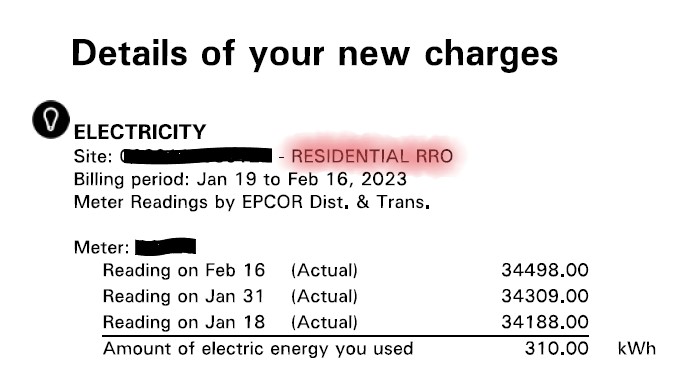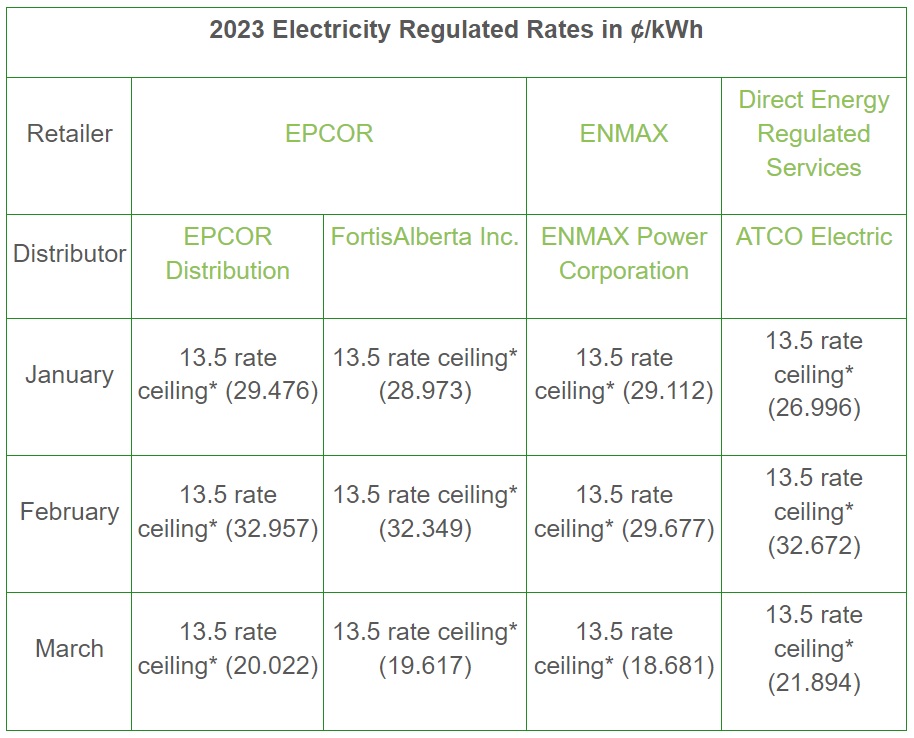This week, Albertans learned a lot more about how they’re charged for electricity. Many consumers learned they were on something called a “regulated rate option” (RRO) — some, by default.

Alberta’s Utilities Consumer Advocate explains on its website: “Customers who don’t sign a contract for natural gas or electricity are served by a regulated retailer. The regulated rates are reviewed and approved by the AUC and can change from month to month.”
A three-month affordability initiative by the provincial government ends March 31. It was put in place to help consumers on an RRO cope with the high costs of power during the cold winter months.
The program capped power charges at 13.5 cents per kilowatt hour for January, February and March 2023 but the real cost of power was somewhere between 20 and 33 cents.
While some Albertans thought the program was saving them money, it simply deferred the price difference to a later date. That so-called electricity debt will have to be paid back over the next 21 months.
“The difference between the approved regulated rates and the price ceiling will be collected over a 21-month period (April 2023 – December 2024),” the AUC explained.
“This will be done by adding a small amount (approximately 2-4 cents) to the monthly regulated rate. This will be about $10 to $20 per monthly bill.”
What are my options for electricity/natural gas?
- Some fixed mortgage rates are up despite hints of Bank of Canada cuts. Why?
- Health task force blasted over ‘dangerous guidance’ for cancer screenings
- Lynx Air says passenger refunds will hurt investors because of defiant contractor
- As Tim Hortons tests plastic-free lids, how eco-friendly are alternatives?
Within the regulated service areas in Alberta, there are three types of rates available: fixed, floating (variable) or regulated.
“Fixed rates are a predetermined rate for a specified period (typically one, three or five years),” explained Chris Hunt, executive director of the Utilities Consumer Advocate.
“Competitive energy retailers purchase energy from the wholesale electricity market and then offer contracts for a specific rate to consumers.”
Floating rates fluctuate monthly and typically align with the cost of the regulated rate option.
“These rates may have additional fees on top of the base rate,” Hunt said. “These contracts allow consumers who do not want to bill with their default supplier to follow market trends without locking in at a fixed rate.”

Fixed and floating rates both require contracts offered by competitive energy retailers. Some contracts require a credit check. Some contain additional fees, requirements or exit fees if a consumer wants to end their contract early.
“Consumers should carefully review all contract details before choosing the one that best suits their needs,” Hunt said.

Regulated rates are offered by the default service provider in the consumer’s service area. They fluctuate monthly based on the market price.
“These rates are reviewed and approved by the Alberta Utilities Commission and are set on the first of every month,” Hunt said. “All consumers have access to the regulated rate. Regulated service requires no contracts and can be set up or ended at any time.”
He stresses consumers can explore other options or choose to remain on the RRO. There is no requirement to switch to a fixed-rate contract.
Which providers offer the RRO in Alberta?
ENMAX, EPCOR, Apex, Direct Energy and several municipalities provide the RRO, depending on where you live in Alberta.
ENMAX Energy Corp. provides RRO services to the cities of Calgary and Red Deer and the towns of Ponoka and Cardston.
EPCOR Energy Alberta provides RRO services in the City of Edmonton and the distribution territory served by Fortis Alberta (most of rural central and southern Alberta).
Direct Energy Regulated Services provides RRO services in the ATCO Electric Service territory (most of northern Alberta and eastern Alberta).
The cities of Lethbridge and Medicine Hat provide their own RRO service.
Some rural Albertans are served by a local Rural Electrification Association (REA).
Why are different rates offered?
Hunt says companies are offering products based on customer demand.
“Some consumers prefer the certainty of a fixed rate, while other consumers (particularly in some sectors of business) may prefer a floating rate that ties prices more directly to the wholesale market, particularly when a consumer has flexibility on when they will consume power.”
The RRO is the default service provided to all small business, residential and farm consumers who use less than 250,000 kilowatt hours per year.
“The RRO is not new and has been the default option since the retail electricity market was deregulated in Alberta 20 years ago,” Hunt said. “Many consumers are unfamiliar with the electricity sector and their retail electricity options. Consumers can learn about their retail power and natural gas options by visiting www.ucahelps.alberta.ca or calling the UCA Mediation Team at 310-4822.”

Are those on RRO left paying for the power price difference?
Some Albertans are choosing to switch to a fixed-rate option now.
An EPCOR spokesperson explained that by moving to a fixed-rate option, consumers don’t have to repay that so-called electricity debt that was deferred over the three winter months.
“This deferral is going to be spread out over the remaining consumers on the RRO. So it’s really better for you if you leave the RRO and go to a competitor,” said Lianne Redmond, director of Encor by EPCOR. Encor is the utility retailer’s competitive (or fixed rate) electricity product.
But Hunt says it’s important to keep this in perspective.
“Right now, there are between 700,000 and 800,000 consumers on the RRO. Even if some leave, the amount being recovered will be spread across a very large number of consumers over the 21-month recovery period.”
The UCA estimates the difference will be about $10 to $20 per monthly bill.
Since most contracts require a credit check, some Albertans won’t be able to switch.
“You could see a situation whereby those who are most disadvantaged – with low credit scores, and can’t leave the RRO – have to pay back both their deferral amounts as well as the amounts of the more astute or higher credit individuals who have left the RRO,” explained Joel MacDonald, founder of energyrates.ca.
Several Albertans who have spoken with Global News say putting the additional burden on people who are already struggling is not right.
“This is a provincial policy and it’s a provincial regulation that came down and EPCOR as a company is just abiding by this regulation,” Redmond said. “I can tell you that we’re always in conversation with the government and we always have the best interest of our customers at heart.”
The UCA also directed further questions about the initiative to the ministry of affordability and utilities.
What if you can’t qualify for a fixed or floating contract?
Hunt says Albertans who can’t qualify for a fixed or floating contract should contact the UCA mediation team for advice at 310-4822 or ucahelps@gov.ab.ca.
“Mediation officers can discuss the customer’s unique circumstances with them to identify eligibility for services with other retailers, programs or grants that may be of assistance, and/or other money-saving tips through wise energy consumption or equalized billing plans,” he said.
Information on current rates and retailer choices is posted on the Utilities Consumer Advocate website.






Comments